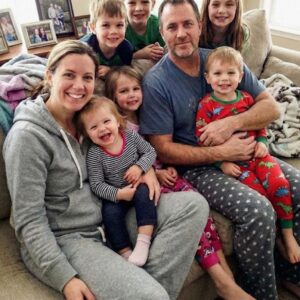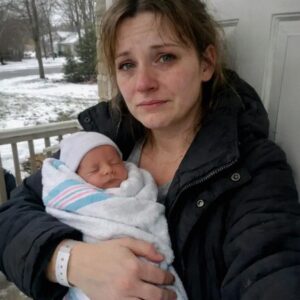
Every Saturday, at exactly 2 p.m., a man riding a roaring black Harley would pull into the cemetery gates. He always parked in the same spot near the towering oak trees, removed his helmet with slow, deliberate movements, and walked with careful steps straight toward my wife’s grave. He never carried flowers or a prayer book. He didn’t speak to anyone. There was no fanfare. Just silence—a quiet, almost sacred kind of grief that seemed to absorb the world around him. He would sit cross-legged on the grass for nearly an hour, eyes locked on her headstone.
Occasionally, his hand brushed away tears, his jaw tightened, and his body seemed to tremble just slightly as he swallowed down the weight of sorrow he carried. At first, I tried to ignore him. Surely, it was a mistake. Perhaps he had misread the name—after all, there were dozens of Sarahs buried in that section of the cemetery. But when the same man arrived the next Saturday, same time, same solemn ritual, I started to feel unsettled. By the third visit, my heart raced with curiosity and something darker—an inexplicable mix of frustration, confusion, and even jealousy. Who was this stranger mourning my wife as if he had lost her too?
Sarah had been gone fourteen months. She was forty-three when cancer claimed her body, though her spirit remained impossibly vibrant to everyone who knew her. She was a pediatric nurse, a devoted mother, my best friend, and my constant confidante for nearly twenty years. She had a rare ability to make anyone feel seen, even in their darkest moments. Her laughter was warm, infectious; her hands steady and gentle. And yet, watching this enormous stranger grieve for her, so openly and so privately at the same time, reopened wounds I thought had begun to heal. It made me question how much I had really known about the woman I loved, the life we shared, and the quiet acts she performed in her day-to-day world that I might never see.
That Saturday, after weeks of watching from the car, my curiosity and unease became too heavy to bear. I decided I would confront him. I waited until he arrived, engine rumbling through the quiet cemetery, and parked exactly where he always did. His leather jacket creaked, his boots pressed against the gravel, and he walked toward Sarah’s grave in the familiar rhythm I had come to dread and yet secretly anticipate. I stepped out of the car, feeling an unfamiliar nervousness knotting my stomach.
When I approached, I saw him fully for the first time. He was enormous, a mountain of a man, leather-clad, his arms tattooed with memories of battles, and a gray-streaked beard shadowing his jaw. His hands, thick and calloused, had clearly carried the weight of a lifetime of labor. When he finally turned toward me, I noticed the red-rimmed eyes, the subtle quiver of his lips, and the way his chest rose and fell with quiet tremors of grief. “I’m sorry,” he said softly, his voice breaking in a way that made the cold autumn air seem warmer. “I didn’t mean to intrude. I just… needed to say thank you.” “Thank you?” I echoed, bewildered. “For what?”
His eyes returned to Sarah’s headstone. “Your wife saved my daughter’s life.” It took several seconds for his words to register. I felt the blood drain from my face, my mind scrambling to understand. He introduced himself as Mike, a mechanic from across town, and slowly recounted a story that felt like it had been waiting years for me to hear. His daughter, Kaylee, had been diagnosed with leukemia at nine. He described the fear that had gripped their family, the endless hospital bills, the desperation of losing everything they owned in a battle to keep her alive.
“The bills never stopped,” he said, his voice catching. “We sold our house, our cars, everything we had. But even then, we were still forty thousand dollars short. I thought I was going to lose her.” He told me how, during that dark time, Sarah had found him slumped in a hospital hallway, trying not to cry, trying to hold himself together. She wasn’t even Kaylee’s nurse, but she had paused, placed a gentle hand on his shoulder, and said simply, “Don’t give up hope. Sometimes miracles happen.” Two days later, an anonymous donor paid the remaining forty thousand dollars of Kaylee’s medical bills. They never found out who it was at the time. Years later, when Kaylee had fully recovered, Mike happened to stumble across an old billing document. Written in the corner, in neat handwriting, was a single name: Sarah. That was when the pieces began to fall into place.
I remembered the moment vividly now. Years earlier, during the hardest time of our marriage, Sarah had quietly withdrawn forty thousand dollars from our savings—money we had been setting aside for home renovations. I had been furious. I accused her of irresponsibility. She had just looked at me, calm and unwavering, and said, “I did what I had to do. You’ll understand someday.”
Standing there beside Mike, at the very grave where he had come every Saturday for months, I finally understood. My wife—my Sarah—had been the miracle he had prayed for. She had saved a little girl’s life, without seeking recognition, without expecting thanks, without ever letting me know what she had done. Tears blurred my vision as Mike continued. “Kaylee’s sixteen now,” he said. “She wants to be a doctor someday, to help kids the way your wife helped her. I just wanted Sarah to know that her kindness didn’t stop with us.”
I could barely speak, but I whispered, “She knows. Trust me, she knows.” From that day on, the tone of Saturdays changed entirely. I stopped hiding in the car. Sometimes Mike brought his wife and Kaylee with him. Together, we shared stories, laughter, tears, and memories. Our grief became something beautiful, something shared rather than isolated. Kaylee eventually brought wildflowers to lay at Sarah’s grave, kneeling with a voice trembling as she whispered, “Thank you for saving me. I won’t waste the life you gave me.” Mike and I forged a bond deeper than friendship—a brotherhood born of grief and gratitude. He would check in on my children, repair things around our house, bring homemade cookies from his wife, and in every small act, Sarah’s spirit shone through him.
Sarah never liked attention. She believed acts of kindness were meaningful only if they were quiet, selfless, and unobserved. She spent her days comforting sick children, and her nights nurturing our family with care and devotion, humming lullabies as she cooked dinner, guiding our children with patience and love. And now, her influence continues to ripple outward, touching everyone who crosses her path, even in her absence. Every Saturday, her legacy rides on the wind of Harley engines and blooms in the wildflowers Kaylee lays by her stone. It lives in every laugh shared between two men who once stood on opposite sides of grief. Her compassion is invisible, unstoppable, and enduring.
Sarah left behind no fame, no fortune, no tangible legacy. She left something infinitely greater: proof that a single act of selfless kindness can change lives, connect strangers, and ripple through generations. Kaylee, once a child on the brink of losing her life, now volunteers at the very hospital where Sarah worked, aspiring to become a nurse just like her savior. And I? I show up every Saturday, not in mourning, but in gratitude, striving to keep her spirit alive, in our hearts, in our home, and in the world she touched without ever seeking the spotlight. Because even gone, Sarah’s presence endures. She remains the quiet miracle, the invisible force, and the enduring light that binds two families together, week after week, year after year.
Every Saturday, at exactly 2 p.m., a man riding a roaring black Harley would pull into the cemetery gates. He always parked in the same spot near the towering oak trees, removed his helmet with slow, deliberate movements, and walked with careful steps straight toward my wife’s grave. He never carried flowers or a prayer book. He didn’t speak to anyone. There was no fanfare. Just silence—a quiet, almost sacred kind of grief that seemed to absorb the world around him. He would sit cross-legged on the grass for nearly an hour, eyes locked on her headstone.
Occasionally, his hand brushed away tears, his jaw tightened, and his body seemed to tremble just slightly as he swallowed down the weight of sorrow he carried. At first, I tried to ignore him. Surely, it was a mistake. Perhaps he had misread the name—after all, there were dozens of Sarahs buried in that section of the cemetery. But when the same man arrived the next Saturday, same time, same solemn ritual, I started to feel unsettled. By the third visit, my heart raced with curiosity and something darker—an inexplicable mix of frustration, confusion, and even jealousy. Who was this stranger mourning my wife as if he had lost her too?
Sarah had been gone fourteen months. She was forty-three when cancer claimed her body, though her spirit remained impossibly vibrant to everyone who knew her. She was a pediatric nurse, a devoted mother, my best friend, and my constant confidante for nearly twenty years. She had a rare ability to make anyone feel seen, even in their darkest moments. Her laughter was warm, infectious; her hands steady and gentle. And yet, watching this enormous stranger grieve for her, so openly and so privately at the same time, reopened wounds I thought had begun to heal. It made me question how much I had really known about the woman I loved, the life we shared, and the quiet acts she performed in her day-to-day world that I might never see.
That Saturday, after weeks of watching from the car, my curiosity and unease became too heavy to bear. I decided I would confront him. I waited until he arrived, engine rumbling through the quiet cemetery, and parked exactly where he always did. His leather jacket creaked, his boots pressed against the gravel, and he walked toward Sarah’s grave in the familiar rhythm I had come to dread and yet secretly anticipate. I stepped out of the car, feeling an unfamiliar nervousness knotting my stomach.
When I approached, I saw him fully for the first time. He was enormous, a mountain of a man, leather-clad, his arms tattooed with memories of battles, and a gray-streaked beard shadowing his jaw. His hands, thick and calloused, had clearly carried the weight of a lifetime of labor. When he finally turned toward me, I noticed the red-rimmed eyes, the subtle quiver of his lips, and the way his chest rose and fell with quiet tremors of grief. “I’m sorry,” he said softly, his voice breaking in a way that made the cold autumn air seem warmer. “I didn’t mean to intrude. I just… needed to say thank you.” “Thank you?” I echoed, bewildered. “For what?”
His eyes returned to Sarah’s headstone. “Your wife saved my daughter’s life.” It took several seconds for his words to register. I felt the blood drain from my face, my mind scrambling to understand. He introduced himself as Mike, a mechanic from across town, and slowly recounted a story that felt like it had been waiting years for me to hear. His daughter, Kaylee, had been diagnosed with leukemia at nine. He described the fear that had gripped their family, the endless hospital bills, the desperation of losing everything they owned in a battle to keep her alive.
“The bills never stopped,” he said, his voice catching. “We sold our house, our cars, everything we had. But even then, we were still forty thousand dollars short. I thought I was going to lose her.” He told me how, during that dark time, Sarah had found him slumped in a hospital hallway, trying not to cry, trying to hold himself together. She wasn’t even Kaylee’s nurse, but she had paused, placed a gentle hand on his shoulder, and said simply, “Don’t give up hope. Sometimes miracles happen.” Two days later, an anonymous donor paid the remaining forty thousand dollars of Kaylee’s medical bills. They never found out who it was at the time. Years later, when Kaylee had fully recovered, Mike happened to stumble across an old billing document. Written in the corner, in neat handwriting, was a single name: Sarah. That was when the pieces began to fall into place.
I remembered the moment vividly now. Years earlier, during the hardest time of our marriage, Sarah had quietly withdrawn forty thousand dollars from our savings—money we had been setting aside for home renovations. I had been furious. I accused her of irresponsibility. She had just looked at me, calm and unwavering, and said, “I did what I had to do. You’ll understand someday.”
Standing there beside Mike, at the very grave where he had come every Saturday for months, I finally understood. My wife—my Sarah—had been the miracle he had prayed for. She had saved a little girl’s life, without seeking recognition, without expecting thanks, without ever letting me know what she had done. Tears blurred my vision as Mike continued. “Kaylee’s sixteen now,” he said. “She wants to be a doctor someday, to help kids the way your wife helped her. I just wanted Sarah to know that her kindness didn’t stop with us.”
I could barely speak, but I whispered, “She knows. Trust me, she knows.” From that day on, the tone of Saturdays changed entirely. I stopped hiding in the car. Sometimes Mike brought his wife and Kaylee with him. Together, we shared stories, laughter, tears, and memories. Our grief became something beautiful, something shared rather than isolated. Kaylee eventually brought wildflowers to lay at Sarah’s grave, kneeling with a voice trembling as she whispered, “Thank you for saving me. I won’t waste the life you gave me.” Mike and I forged a bond deeper than friendship—a brotherhood born of grief and gratitude. He would check in on my children, repair things around our house, bring homemade cookies from his wife, and in every small act, Sarah’s spirit shone through him.
Sarah never liked attention. She believed acts of kindness were meaningful only if they were quiet, selfless, and unobserved. She spent her days comforting sick children, and her nights nurturing our family with care and devotion, humming lullabies as she cooked dinner, guiding our children with patience and love. And now, her influence continues to ripple outward, touching everyone who crosses her path, even in her absence. Every Saturday, her legacy rides on the wind of Harley engines and blooms in the wildflowers Kaylee lays by her stone. It lives in every laugh shared between two men who once stood on opposite sides of grief. Her compassion is invisible, unstoppable, and enduring.
Sarah left behind no fame, no fortune, no tangible legacy. She left something infinitely greater: proof that a single act of selfless kindness can change lives, connect strangers, and ripple through generations. Kaylee, once a child on the brink of losing her life, now volunteers at the very hospital where Sarah worked, aspiring to become a nurse just like her savior. And I? I show up every Saturday, not in mourning, but in gratitude, striving to keep her spirit alive, in our hearts, in our home, and in the world she touched without ever seeking the spotlight. Because even gone, Sarah’s presence endures. She remains the quiet miracle, the invisible force, and the enduring light that binds two families together, week after week, year after year.

